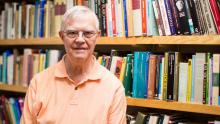Foucault on Power12
Dec 3, 2018Michel Foucault had some truly brilliant and important insights about power, insights that have had an important influence on some of today’s most prominent activist movements, and that arguably should be having more of an influence on others. It’s true that there’s a lot to take issue with in his work, but there’s also a lot to be inspired by.




Comments (5)
Harold G. Neuman
Wednesday, November 14, 2018 -- 3:07 PM
Most of us are familiar withMost of us are familiar with the old adage, KNOWLEDGE IS POWER. This suggests that in order to have the second, one must have the first. Yet, there have been many times in the history of man, when the sheer force of numbers has negated any need for knowledge, beyond knowing that strength of one's adversaries. This is/was elementary. Mr. Foucault was no more or less adept in his assessment of things than those such as Rousseau, Hume, Locke, or Kant. Everything changes with time and enlightenment. And science. And philosophy. And, progress.
Harold G. Neuman
Monday, December 3, 2018 -- 11:26 AM
A little something more onA little something more on what we think we know. I sent this to my brother, as a Christmas greeting. He liked it. Maybe you will too:
To Infinity, (and then some...)
In his 1689 treatise, Concerning Human Understanding, John Locke waxed abundant on the notion of INFINITY. That he did so was au courant for his time, as are such philosophic discourses in our own. I'd very much like to clear the air and flush the toilet on this matter, once, if not, for all. Infinity is (I assert) a nebulous construct from human reason and language. Mulling and muddling over it is about as productive as counting clover leafs in a midsummer meadow. It is a long haul, past and future, but plays not into the scheme of human evolution, history or affairs.
It was neither needed, nor critically useful to physics, mathematics or science in general. Constructions ARE, sometimes helpful to their progenitors. Quantum Mechanics (for example) allows for some measurement of things very small. I cannot claim to understand it, yet can project its value, when/if it should be better understood. Richard Feynman would probably approve.
People feel better about things they can quantify or qualify. I have no quarrel with that. But unless you love the heat of philosophy; the thrill of agony; or the victory of defeat, you may as well cross infinity of your list (be that 'bucket' or other). It is not an achievement. Neither you, nor I nor anyone else will ever get there...there is no 'there' to get to.
Harold G. Neuman
Tuesday, January 29, 2019 -- 12:13 PM
Mon frere, Michel Foucault,Mon frere, Michel Foucault, was quite the social historian, I have discovered, after reading some of his writing. Interesting intellect. However, I cannot in my own view categorize him as: philosopher. His scholarship defines him more in the historian modality, even though he clearly had a philosophy of life. I would, hesitantly, compare Foucault to some of our latter-day public intellectuals: important for their contributions to knowledge generally and/or specifically, but only incidentally influential to the broader cosmology of philosophy itself.
Tim Smith
Tuesday, June 1, 2021 -- 6:56 AM
This show is topped off withThis show is topped off with Potassium Benzoate
.
..
...
....
That's Bad.
Harold G. Neuman
Saturday, June 5, 2021 -- 12:52 PM
Nothing more to say ofNothing more to say of Foucault. He stated the obvious.